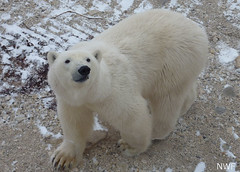We have much more to do and your continued support is needed now more than ever.
He’s Back! BP’s Tony Hayward Cuts Deal To Drill In Arctic Wildlife Haven

Former BP CEO Tony Hayward is back in the news – and once again, he’s putting critical wildlife habitat at risk.
Hayward was unceremoniously shipped to Siberia by BP last July. He’d had become a symbol of British Petroleum’s remarkable combination of arrogance & incompetence, declaring he wanted the Gulf oil disaster over so he could have his cushy life back, then enjoying a day on a yacht while oil washed ashore in Louisiana & Florida.
Now Tony’s back on his feet – and once again drilling for oil in sensitive wildlife areas:
Vladimir Putin used a Russian proverb to explain why he’s granting BP Plc access to 125,000 square kilometers (48,000 square miles) of Arctic water: the man who’s been beaten is worth two who haven’t.
The Russian prime minister is betting that BP has learned from the trauma of last year’s Gulf of Mexico oil spill and won’t repeat the same mistake. The Jan. 14 meeting with Chief Executive Officer Bob Dudley in a ceremonial room at Putin’s country retreat sealed an agreement to swap BP shares for a holding in OAO Rosneft, Russia’s largest oil producer.
The summit ended negotiations that started when Dudley’s ill-fated predecessor Tony Hayward visited Russia to seek support as the Gulf of Mexico oil spill threatened to destroy the London-based company. Talks gained pace after Dudley took the helm at the start of October, and over hundreds of meetings the agreement that puts BP at the centre of Russian oil exploration took shape, people involved in the deal said.

The deal will allow BP to drill in the South Kara Sea, home to the Great Arctic State Nature Reserve, one of the largest nature reserves in the world. The Kara Sea large marine ecosystem (LME) supports a diversity of wildlife:
Bearded seals, walruses, and narwhals breed and rest on the coastal areas of the Kara Sea. The polar bears hunt for seals on the frozen edge of the sea. There is an abundance of fish such as Arctic cod, flatfish, and smelt.
That wildlife is already under attack:
The Kara Sea LME is impacted by a variety of anthropogenic contaminant sources. Oil and gas development and fisheries impacts pose severe threats to the region. Radioactive materials dumped into the Kara Sea LME may be severely impacting the ecosystem, resulting in the deaths of sea stars, shellfish, seals, porpoises and fishes. … The Siberian rivers discharging into the Kara Sea LME encompass industrial and agricultural regions within their watershed. In these industrial regions the air, water and soil are polluted by harmful substances. Obsolete technologies and the lack of facilities for processing industrial waste are major ecological problems.
Obsolete technology? Lack of facilities? Gee, doesn’t sound like they’d have any problems responding to a major oil disaster, does it?
But this story illustrates the shortcomings of America’s own response to the Gulf oil disaster – Congress hasn’t taken any steps to change our energy sources. Even if we tailor our drilling policies to drill in the most responsible manner & only where it can be done safely, if we don’t change our energy policies to curb our addiction to oil, we’re just shifting the risks to wildlife & precious places in other parts of the world.
Please take a moment right now to tell Congress we need to protect the Clean Air Act. It can help us protect polar bears & other wildlife both now & in the future – cutting our need to drill in the short term & reducing our global warming pollution in the long run.






















